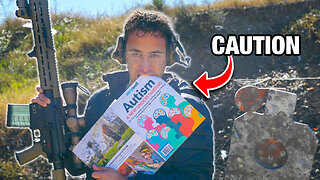Premium Only Content
!['XPD' (1998) by Len Deighton [Radio Play]](https://1a-1791.com/video/fww1/b4/s8/1/A/j/D/3/AjD3y.qR4e-small-XPD-1998-by-Len-Deighton-Ra.jpg)
'XPD' (1998) by Len Deighton [Radio Play]
This radio adaptation of 'XPD' stands as a gripping and atmospheric exploration of historical secrets, Cold War politics, and moral ambiguity. Adapted from Len Deighton’s 1981 novel, this radio play succeeds in translating Deighton’s intricately plotted espionage thriller into an immersive audio experience that is both intellectually stimulating and emotionally resonant.
Narrative and Themes:
At its core, 'XPD' (an abbreviation for "Expedient Demise") is built on an audacious premise: that in 1945, Winston Churchill met with Adolf Hitler in secret, and that this meeting — and the resulting documentation — could unravel the post-war Western political order if ever revealed. In the hands of Deighton, this speculative history is not played for conspiracy fantasy but rather as a vehicle for exploring how power is preserved through secrecy, manipulation, and the careful control of narratives.
The radio play, tightly focused on the protagonist Boyd Stuart, a former wartime intelligence officer drawn into a dangerous game decades later, unfolds with quiet dread. As Stuart becomes entangled in a shadowy conspiracy involving rogue intelligence officers, Nazi collaborators, and secret service officials intent on preserving old lies, the listener is steadily pulled into a world where truth is expendable, and expediency reigns.
The central tension — between personal loyalty and political necessity, between private morality and institutional ruthlessness — is echoed in the intimate sound design and performances. The story is not just a tale of spies, but a meditation on history’s fragility and the moral compromises embedded in victory.
Radio as a Medium: Atmosphere and Intimacy:
This adaptation excels at using radio's limitations as strengths. Deighton’s work, rich in internal monologue and oblique suggestion, fits naturally into a format where implication matters more than explicit action. There are few gunfights or explosions; rather, the danger unfolds in overheard phone calls, coded conversations, and the gradual sense that the walls are closing in.
The soundscape evokes both the post-war world and the Cold War’s bleak realism. Crackling radios, footsteps echoing in corridors, the rustle of paper files — all underscore the bureaucracy and banality of intelligence work, contrasting with the high stakes at its core. Music is sparingly but effectively used, lending a noir-tinged gravitas to moments of revelation and doubt.
Voice acting, a critical component of radio drama, is uniformly strong. The actor portraying Boyd Stuart imbues him with a weary idealism that gradually fractures under pressure, while the supporting cast — from smooth-talking agents to cold bureaucrats — creates a convincingly layered world of intersecting loyalties and agendas. The performances carry much of the emotional weight, particularly in scenes where Stuart must choose between family, truth, and survival.
Deighton’s Political Intelligence:
Len Deighton’s politics are never crudely didactic, but the adaptation preserves his clear-eyed view of institutional self-interest and historical cynicism. The play captures the idea that intelligence work is often less about stopping villains than about preserving fictions deemed essential to national security — and that today's truths may be tomorrow's liabilities.
There are also subtle jabs at British nostalgia for the Second World War — the myth of a clean victory, the silence around unsavory compromises, and the selective memory of who did what, and why. 'XPD' suggests that the real cost of such myth-making is borne by people like Boyd Stuart: professionals and patriots who are ultimately used, discarded, or silenced when the truth becomes inconvenient.
Pacing and Structure:
Though the original was serialized, as a continuous play 'XPD' maintains a steady, measured rhythm. The plot is complex — typical of Deighton — but the adaptation manages to keep the listener oriented through careful exposition and shifting perspectives. The tension builds cumulatively rather than explosively, with late reveals landing not as shocks but as grim inevitabilities.
Listeners unfamiliar with the source novel may find themselves challenged by the play's density and refusal to simplify. There are no easy heroes, no clear victories. But those who persevere are rewarded with a layered story that lingers in the mind — not because of its twists, but because of its disquieting plausibility.
Conclusion: An Auditory Espionage Masterwork. Thhis radio adaptation of 'XPD' does full justice to Len Deighton’s haunting novel. It is a work of shadows and echoes, not bombast; a story about the lies we call history, and the people caught in their wake. As a single uninterrupted radio play, it becomes a dark meditation on the cost of secrecy and the erosion of truth — themes that are more relevant than ever.
With its mature tone, strong performances, and atmospheric production, 'XPD' is not just a successful adaptation — it is arguably one of the finest examples of how radio drama can handle the espionage genre. It requires concentration, but rewards it tenfold. In the world of Deighton, listening is not just passive entertainment — it’s survival.
-
 LIVE
LIVE
BEK TV
23 hours agoTrent Loos in the Morning - 11/06/2025
156 watching -
 8:10
8:10
The Shannon Joy Show
17 hours agoShould we even VOTE anymore?
17.1K23 -
 59:34
59:34
Dialogue works
1 day ago $0.02 earnedMohammad Marandi: It’s WAR: Iran’s Supreme Defense Council ACTIVATES –Hezbollah REFUSES to Surrender
49.9K11 -
 10:23
10:23
TheSaltyCracker
18 hours agoMuslims Immediately Threaten New Yorkers After Zohran Win
43.7K451 -
 18:40
18:40
Actual Justice Warrior
17 hours agoMamdani Pledges To DESTROY New York
30.7K75 -
 28:53
28:53
iCkEdMeL
17 hours ago $0.06 earnedBREAKING: 9 DEAD After UPS Plane BURSTS Into Fireball at Louisville Airport
35.1K7 -
 20:52
20:52
Professor Nez
20 hours agoThe TRUTH is Actually WORSE than we Thought...
24.6K24 -
 8:59
8:59
MattMorseTV
19 hours ago $0.08 earnedTrump’s DIRE WARNING to the Senate GOP.
82.7K86 -
 2:13:33
2:13:33
Side Scrollers Podcast
21 hours agoAsmongold SUED for Emotional Distress + Hasan REJECTED+ INSANE Plane Crash + More | Side Scrollers
96.2K28 -
 21:39
21:39
Nikko Ortiz
4 days agoI Take A North Korean Shooting
86.5K11